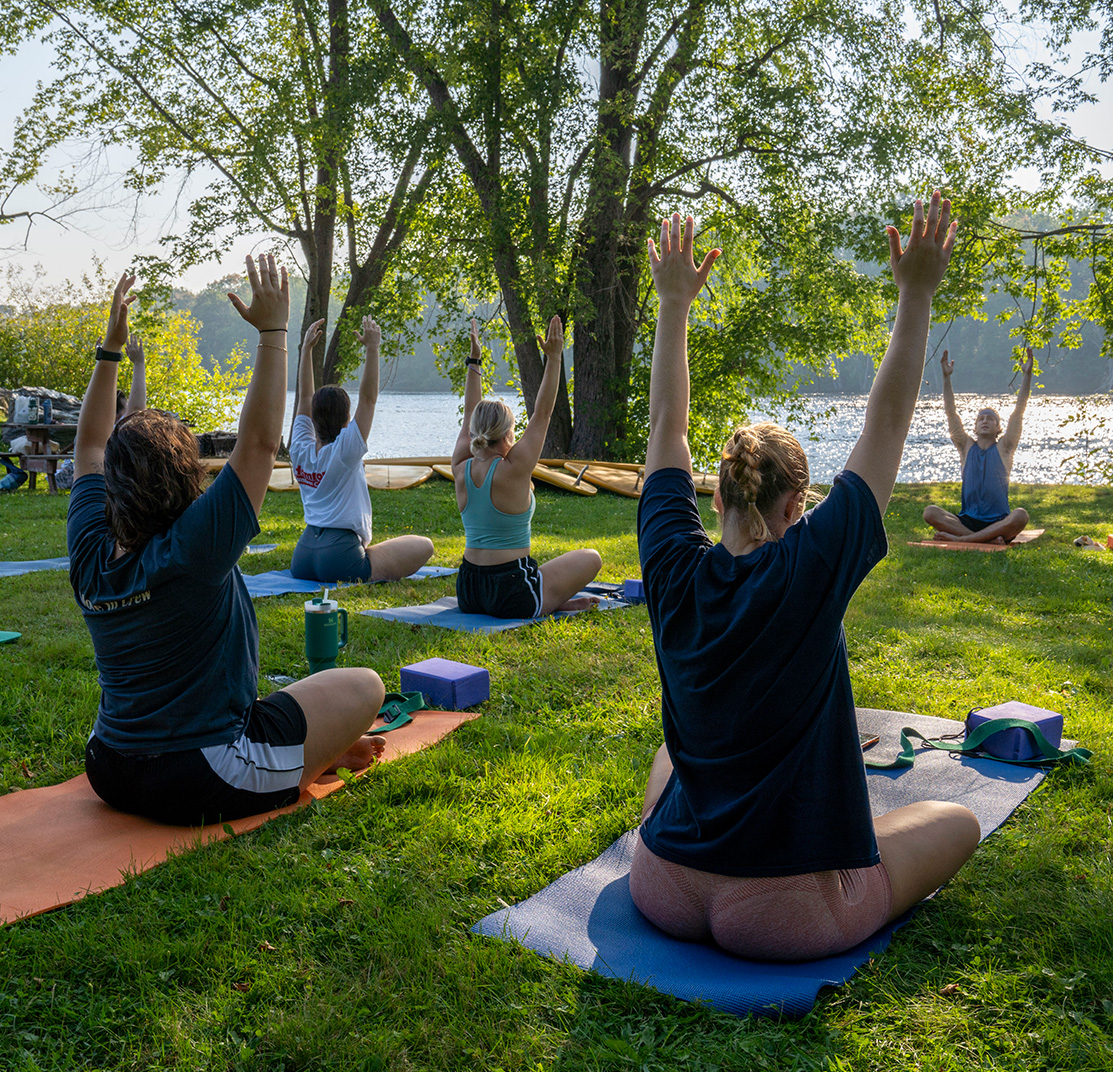Research Learning Experience
School of Nursing Research Learning Experience Bridge Week Overview
How Will You Thrive as a Nursing Student?
25 clock hours
This immersive bridge week introduces students to artistic and scientific practices, focusing on their impact on health and well-being. Students participate in evidence-based resilience and well-being interventions, including mindfulness, yoga, belonging activities, student success workshops, and research design. Some students engage in mindful physical activity, while others participate in a mindful nutrition MasterChef program. After the bridge week, all students complete the one-credit NUR150 Scholarship of Wellness and Mindfulness course, which includes booster doses of interventions and assessments. FitBits are provided to analyze data related to the interventions.

RLE Objectives
- Define mindfulness and its relationship to stress, eating, fitness, kindness, and compassion
- Describe the body’s reaction to stress
- Discuss stress in the body
- Describe the relationship between thoughts, stress, fitness, and eating
- Introduce eating, movement, breathing, and communication mindfulness practices
- Define PICOT
- Develop a PICOT research question
- Define the Six Dimensions of Wellness
- Assess Six Dimensions of Wellness
- Demonstrate the ability to practice basic mindful eating skills, including identification of internal and external influences on food choices.
- Create college-accessible, nutrient-dense recipes
- Describe strategies on how to incorporate healthy choices and health behaviors, despite perceived barriers
Workshops
Students will undergo the 6-session Introduction to Mindfulness curriculum based on Wolf and Serpa’s (2015) A Clinician’s Guide to Mindfulness. The course covers various topics, from defining mindfulness to exploring the influence of thoughts on stress and actions. Each 90-minute session teaches evidence-based techniques such as meditation, mindful eating, movement, communication, and embracing pleasant and unpleasant experiences. Sessions prioritize interaction, support, and group participation to facilitate extensive practice and application of mindfulness techniques.
Mindful physical activity involves moving with present-moment awareness. It can reduce anxiety symptoms (Yin et al., 2021) and aims to foster mindful movement, adapt to change, establish sustainable habits, and strengthen community bonds. Throughout Bridge Week, participants practice applying mindfulness to everyday activities like walking, running, strength training, cardio machines, and rock climbing. They explore campus resources such as the New Balance Student Recreation Center and MaineBound for equipment rentals and outdoor activities. Mindful breathing, group stretching, and mobility exercises start each day, followed by discussions on transitions, goal setting, and overcoming challenges. Participants create and display photos depicting ways to incorporate mindful movement into their daily lives, shared with the Master Chef intervention and UMaine Nursing Instagram page.
Mental health significantly impacts physical health outcomes among college students. Higher levels of anxiety, stress, and depression are associated with poorer diet quality (Wattick et al., 2018). Various factors influence dietary choices in this population, including intrapersonal (self-efficacy, knowledge, body image, financial restraints), interpersonal (social influence), and community factors (academic demands) (Sextom-Dhamu, 2021). Addressing these influences effectively and improving self-efficacy can enhance diet quality, reducing the risk of diet-related chronic diseases (USDA). Additionally, research suggests that incorporating gamified learning or game design elements into education improves college students’ learning experiences (Martín-Hernández, 2021). Building on these findings, the Master Chef: Nursing Edition Curriculum was developed. This evidence-based nutrition education curriculum integrates nutrition education, mindful eating, and body appreciation into a cooking competition, where students create meals with ingredients and vote on the best dishes. The curriculum aims to promote positive health behaviors, improve diet quality, and reduce the risk of diet-related chronic diseases among college students through nutrition education, mindful eating, and enhanced cooking self-efficacy.
In this 90-minute session, students will receive guidance on creating a research question related to their holistic health. Students will formulate a clinical research question using the PICO framework (Population/Problem, Intervention, Comparison, Outcome). They will assess their health across the Six Dimensions of Wellness Framework (social, intellectual, physical, spiritual, emotional, and social) and choose a priority area for focus during their first semester of college. Using the PICOT framework, students will identify the problem they wish to address, the intervention they plan to implement, and the evaluation method(s) for tracking outcomes.
Students will explore the art and science of yoga during the bridge week. Yoga is a philosophy that integrates the mind, body, and spirit, promoting the creative expression of movement akin to dance, music, and painting. The scientific aspects of yoga substantiate its positive impact on health, resilience, and well-being. Led by a trained instructor, students will participate in four 60-minute yoga sessions. They will practice various yoga postures and assess their effects on health metrics and outcomes, utilizing a Fitbit device to monitor sleep, heart rate, daily movement, and stress scores.
Students will engage with the School of Nursing’s Student Success Coordinator and their Academic Advisor to assess vulnerabilities and express their beliefs, values, and characteristics that make them unique. They will engage in team-building and trust-building activities to promote connection and belonging and explore the health benefits of social connectedness.
In this workshop, students will focus on the intellectual domain of health and strategies for academic success as first-year students. They will recognize their unique strengths and attributes and explore supportive strategies, including accessing services and challenging stereotypes associated with accommodations. Students will evaluate their outside engagements, such as work, band, athletics, and friendships, and explore alternative curriculum pathways provided by the School of Nursing. These pathways enable students to graduate in four years by taking off-term courses, lightening their academic load, and allowing them to prioritize various aspects of their lives. Emphasizing health, resilience, and well-being, this workshop acknowledges that academic success relies on students’ overall well-being.
This interactive campus scavenger hunt focuses on destigmatizing mental health needs and promoting academic support. Students will participate in a hunt across campus, identifying essential services that aid their success, including the counseling center, library, accessibility services, wellness center, New Balance Rec Center, Academic Advisor office, School of Nursing Wellness Room, School of Nursing Study rooms, and more. Students will take a photo at each stop and tag the UMaine School of Nursing’s Instagram account with a designated hashtag.

